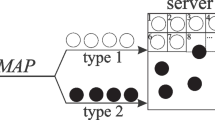Abstract
The busy-period length distributions and blocking probabilities are considered for finiteG/G/1/K queues with state-dependent Markov renewal arrivals. The Laplace-Stieltjes transforms of the distributions and blocking probabilities are given for the non-preemptive and last-come-first-served preemptive resume (or repeat) service disciplines. For Erlangian (or deterministic) service times in particular, it is proved that the busy-period length (the number of blocked customers) for the non-preemptive discipline is smaller (larger) than for the preemptive resume discipline.
Similar content being viewed by others
References
A. Brandt, P. Franken and B. Lisek,Stationary Stochastic Models (Wiley, Chichester, 1990).
O. Hashida, On the busy-period in the queueing system with finite capacity, J. Oper. Res. Soc. Japan 15 (1972) 115–137.
N.K. Jaiswal,Priority Queues (Academic Press, New York, 1968).
J. Keilson, Exponential spectra as a tool for the study of server-systems with several classes of customers, J. Appl. Prob. 15 (1978) 162–170.
D.M. Lucantoni, K.S. Meier-Hellstern and M.F. Neuts, A single server queue with server vacations and a class of non-renewal arrival processes, J. Appl. Prob. 22 (1990) 676–170.
F. Machihara, First passage time ofPH/PH/1/K andPH/PH/1 queues, J. Oper. Res. Soc. Japan 30 (1987) 1–26.
F. Machihara, Completion time of service unit interrupted by PH-Markov renewal customers and its application,Proc. 12th Int. Teletraffic Congress, Torino (1988) 5.4B, pp. 5.1–5.8.
F. Machihara, A new approach to the fundamental period of a queue with phase-type Markov renewal arrivals, Commun. Statist. Stochastic Models 6 (1990) 551–560.
L.W. Miller, A note on the busy-period of anM/G/1 finite queue, Oper. Res. 23 (1975) 1179–1182.
M.F. Neuts,Matrix Geometric Solutions in Stochastic Models: An Algorithmic Approach (The Johns Hopkins University Press, Baltimore, 1981).
M.F. Neuts,Structured Stochastic Matrices of M/G/1 Type and Their Applications (Marcel Dekker, New York and Basel, 1989).
M.F. Neuts, The fundamental period of the queue with Markov modulated arrivals, in:Prob-ability, Statistics and Mathematics: Papers in Honor of Professor Samuel Karlin (Academic Press, 1989).
M.F. Neuts, Models based on the Markovian arrival process, IEICE Trans. Commun. E 75-B (1992) 1255–1265.
J.G. Shanthikumar and U. Sumita, On the busy-period distributions ofM/G/1/K queues with state-dependent arrivals and FCFS/LCFS-P service disciplines, J. Appl. Prob. 22 (1985) 912–919.
Author information
Authors and Affiliations
Rights and permissions
About this article
Cite this article
Machihara, F. Busy-period and blocking behavior of finite queues with state-dependent Markov renewal arrivals. Queueing Syst 16, 97–113 (1994). https://doi.org/10.1007/BF01158951
Received:
Revised:
Issue Date:
DOI: https://doi.org/10.1007/BF01158951




